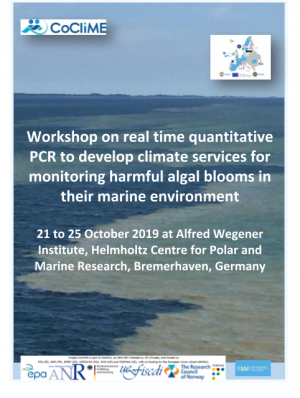Workshop on real time quantitative PCR to develop climate services for monitoring harmful algal blooms in their marine environment
21st to 25th October 2019 at Alfred Wegener Institute, Helmholtz Centre for Polar and Marine Research, Am Handelshafen 12, 27570 Bremerhaven, Germany
This workshop is aimed at giving participants an understanding of real time quantitative PCR and its applications in harmful algal bloom (HAB) monitoring. The course includes presentations, discussions, and hands-on demonstrations and covers all aspects of qPCR development and application, from designing a qPCR assay and preparation of defined samples to data analysis and trouble shooting. SYBR green and TaqMan assays will be applied with focus on key species groups of HAB microalgae (e.g., Alexandrium, Ostreopsis, Phaeocystis and Pseudo-nitzschia spp.). After completing the course participants will be able to design qPCR assays specific for their individual needs and perform qPCR experiments as well as to interpret and analyze the gained data. Furthermore, the workshop will give insights into fluorescence in situ hybridization (FISH) as a validation tool for quantitative real time PCR.
The workshop is intended for persons working in or planning to initiate harmful algal monitoring programs, and are interested in and equipped to applying this molecular technology. Participation is limited to 10 participants, with a documented professional interest in phytoplankton identification by molecular biological methods. Applications should be sent by email to: Kerstin Tobe ([email protected]; cc: [email protected] and [email protected]) before April 15, 2019. A short letter justifying the participation of the applicant and details of the proposed application of the knowledge gained to HAB monitoring should be submitted. A brief CV of the applicant’s experience and qualifications must also be provided. The course will be taught in English and a good knowledge of English is therefore required. There will be no registration fee, but participants will have to provide for their own travel and accommodation expenses.
Goals of the Workshop
- To give participants a deeper understanding of qPCR and its applications
- To improve harmful algal bloom detection by using molecular tools
- To explore the potential application of qPCR for the monitoring and forecasting of harmful algal blooms in (own) monitoring programs
- To provide guidance for developing own qPCR assays for desired target species
- To validate qPCR achieved results by applying light microscopy and fluorescence in situ hybridization (FISH) on selected samples


